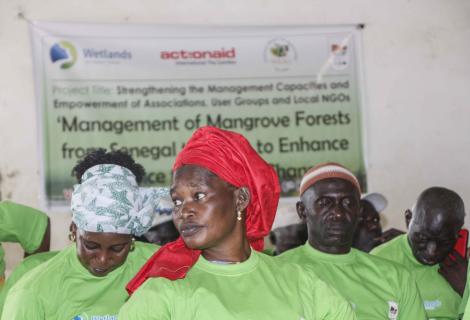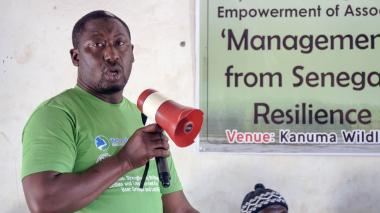Mangrove Forests Project launched

AAITG and Partners Launch Mangrove Forests Project to Enhance Resilience to Climate Change.
Group photo of participants
ActionAid International The Gambia in partnership with the National Alliance for Agroecology – The Gambia and Wetlands International, a global NGO promoting wetland conservation and sustainable management of biodiversity, based in Senegal, on Saturday 6th May 2023, launched two projects in Kanuma, North Bank Region.
Cross session of participants
The two projects: (1) Strengthening the Capacities of Local Associations Management and Service Delivery capabilities and (2) Sustainable Forest Management through Enhanced Livelihood and Biodiversity Conservation in the Protected Areas, are all part of the EU-funded programme – Preservation of Biodiversity and Fragile Ecosystems, Environmental Governance and Climate Change in West Africa (PAPBio), under the project component: ‘Management of Mangrove Forests from Senegal to Benin.’
Musa Sowe, the Secretary General of the National Alliance for Agroecology – The Gambia, who is also the Project Manager, said that the project will create livelihood opportunities to strengthen the resilience of people living in the project target areas. It will further include training in management, leadership, governance, financial management and recordkeeping of members of both forest parks.
Musa Sowe, NAAG Secretary General & Project Manager
“It is important to build people’s capacities to be able to keep proper inflow of cash that is generated from the sales of non-timber forest products. Other activities of the project will include proposal development to enable the management committees to be able generate extra/additional income to run their daily activities,” said Mr. Sowe.
In her remarks, Michel Mendy, Kanuma Ward Councilor said that people are benefiting from the gift of nature – the forest and the sea but a few are abusing it at the detriment of the majority. She said that the frequent cutting down of trees is causing serious harm to the lives of the people living in the community, and it is also affecting the wildlife.
Michel Mendy, Lady Councilor, Kanuma Ward
According to Councilor Mendy, women are the ones engaged in oyster harvesting, but if the mangroves where the oyster lay their eggs are destroyed, that will affect their livelihoods. She urged community members to desist from such destruction. She suggested that measures should be put in place where oyster harvesting and fishing in our seas are allowed at specific periods. This she said, will help protect the country’s aquatic resources from excessive fishing or harvesting.
Mr. Sarjo Manneh, the Park Manager for Niumi National Forest Park said that the project is timely and it’s time for people to know and understand the importance of mangroves. Manneh stressed the need to protect the environment, which include the mangroves. He stated that people’s livelihoods depends entirely on land, air and sea. Therefore, the resources provided by nature must not be exploited.
Sarjo Manneh, Niumi National Park Manager
According to Mr. Manneh, the Department of Forestry usually conduct forest inventory every ten years to assess the country’s forest cover. The last inventory conducted was in 2009-2010 and the findings were so worrying. It indicates that the Gambia is losing a lot of forest (a huge amount of) forest cover because of rampant treefelling. Most of our indigenous tree species are now extinct. “The men are mostly involved in tree felling. You never see a woman with a chainsaw going to the forest cutting down trees” he concludes.
A drummer entertaining participants
Representing the Executive Director of ActionAid International The Gambia, Mr. Saidina Alieu Jarjou, ActionAid’s Fundraising Manager said that climate change is real and its affecting the environment. He cited an example by stating that most of the participants in the hall are fanning themselves with pieces of paper because of the extreme hot weather condition. He said that thirty years ago the Gambia was not as hot as it is today. Therefore, people should ask themselves ‘What went wrong’?
Saidina Alieu Jarjou, AAITG Fundraising Manager
Mr. Jarju also stated that the country’s agricultural sector and food production is declining due to climate change, and that has threatened the country’s food security. Thus, the project is trying to address some of those gaps. He added that the project will not leave young people out.
“Most of our youth have ventured into irregular migration and that has affected the country’s labour force. Some have made it to Italy, but many lives have also perished in the Mediterranean Sea. This project will include potential youth, as well as returnees, by building their capacities and engaging them in order for them to stay at home” said Jarjou.
He also emphasized the issue of sustainability. According to him, sustainability is a major challenge with most projects in the Gambia. The impacts of most projects could not be seen because immediately some projects end, communities do not put in more effort to sustain those projects. Therefore, everything goes down the drain. Jarjou urged the community of Niumi and Jokadou to sustain the project for their own good.
Delivering his launching statement, Mr. Alpha Mairam Khan, the Chief of Jokadou District said that about three to four decades ago, The Gambia had a very rich and healthy environment that was protected by people who never got such funding opportunities, but they were able to preserve the environment by planting many different tree species because then, the people were committed and there was rule of law.
Alpha Mairam Khan, Chief of Jokadou District
“A lot of funding on environmental protection and restoration has been pumped into this county yet the impact is very minimal. It’s either the people do not know the importance of environment, or they are not interested,” said Chief Khan.
The Chief also added that elected officials hardly discuss environmental issues or include it in their manifestos when vying for elective positions.
He also said that the project should focus on training people who are interested in moving the project forward, rather than training the same people over and over again with little or no impact.
Finally, he thanked ActionAid, NAGG, Wetlands and the EU for the project before declaring the project launched.
Cross session of participants
Both projects will be implemented in the North Bank Region at Niumi National Forest Park and Jokadou National Forest Protected Areas for a period of twelve months. It is intended to promote sustainable forest management of the protected areas, and improving the living conditions of local communities, reduce deforestation and forest degradation and enhance resilience to climate change in the intervention areas.
The programme was attended by over one hundred participants including heads of different villages, representative of the Chief of Lower Niumi and members of the Rural Women Assembly.
Cross session of participants

